People aren’t just loosening their belts after their Christmas dinner. They’re loosening their purse strings in a bid to find a Boxing Day bargain.
While it might not be as big as Black Friday, Boxing Day is still a key date for retailers—especially if your customers are primarily UK-based.
Traditionally celebrated on December 26th, Boxing Day has shifted from its Victorian roots of charity and gratitude to become a major shopping holiday in countries like the UK, Canada, Australia, and South Africa.
For retailers, it’s a prime opportunity to keep the momentum of holiday sales going.
Sure, Black Friday might steal the global spotlight, but Boxing Day offers something unique: a chance to engage customers ready to spend their gift money or nab post-Christmas discounts, all wrapped up in a memorable end-of-year shopping experience.
If you’re not sure where to start with your marketing campaign, we’ve got you covered with 9 Boxing Day marketing ideas for closing out the year strong.
Align your marketing campaigns with relevant holidays and year-round celebrations.
1. Treat your VIPs to something special…
…before you open up your sale to your general audience.
Your VIPs are the customers who keep coming back to spend money with your brand, year after year, sale after sale.
Especially over the holidays, these VIPs deserve a little something extra for their loyalty, whether that’s early access to a sale or product drop or an exclusive discount.
Every definition of a VIP is subjective because every brand is different. If you’re wondering who your best Boxing Day VIPs are, use audience segmentation to find:
- Customers who spent more than a certain amount over the holiday season
- Customers who bought from your brand over multiple holiday seasons
- Customers who are part of your loyalty program
Boxing Day marketing tip: If you’ve been collecting a fair amount of customer data and want to get more sophisticated with your segments, consider building them with AI. If, for example, you want to create Boxing Day VIP segments based on regional attributes, it’s easier to create those segments with a natural language prompt than by manually cross-referencing data.
Boxing Day marketing example: Sukoshi Mart gives their VIPs early access
Here’s a great example from K-beauty lifestyle brand Sukoshi Mart. Their Boxing Day marketing email uses a bright, bubbly design to let subscribers know they’re lowering prices up to 60% sitewide. But just under the fold, the email makes it clear who has “exclusive early access” to the sale and who only has general access, with a countdown clock that urges all recipients to act fast before the sale ends.
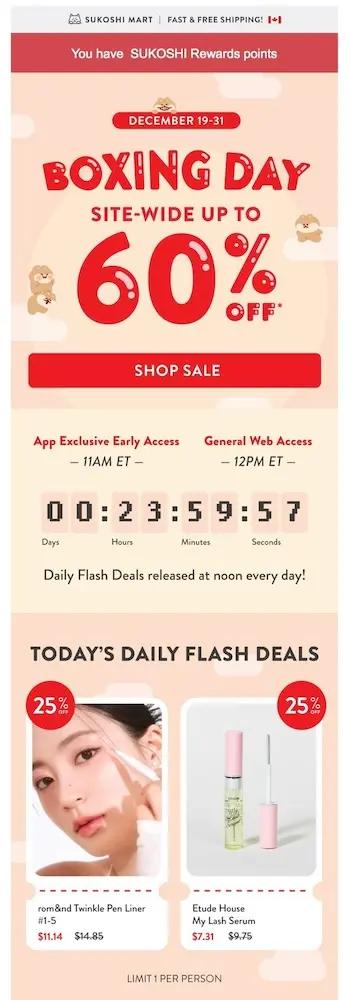
Source: Milled
2. Promote a general Boxing Day sale or discount
Once you’ve rewarded your VIPs for their loyalty, open up your Boxing Day sale to your general audience.
After the expensive pre-Christmas shopping season, one way to engage your subscribers during the lull between Christmas and New Year’s is to highlight how much they can save when they buy your products.
Here are a few example subject lines for this Boxing Day marketing idea:
- Boxing Day Sale: Get 20% off everything!
- Our Best Ever Boxing Day SALE! £50 off all [insert product category]
- Surprise! MEGA 50% Off Boxing Day Sale
Just keep in mind that, similar to Black Friday Cyber Monday (BFCM), people’s inboxes are flooded during Boxing Day. That means you’ll need to:
1. Create email subject lines at scale.
Use AI to speed up the creation of many, many subject line tests. A subject line assistant can write many drafts based on what’s performed well for you in the past.
2. Personalise subject lines for each recipient.
A/B testing used to be, well, A/B. Now, with AI, you can search for patterns among test recipients and ultimately predict which variation will perform better for each shopper. That way, after the test is over, each recipient receives the subject line they’re most likely to open.
Boxing Day marketing tip: A subject line is only as good as the offer on the other side of it. Make sure your Boxing Day sale meets the moment with a big, bold call-to-action (CTA) button to get people’s attention.
Boxing Day marketing example: Skinnydip London’s CTA is front and centre
Here, see how lifestyle fashion brand Skinnydip London makes their winter sale 50% discount offer impossible to miss, enticing subscribers to click the prominent CTA to shop and save.
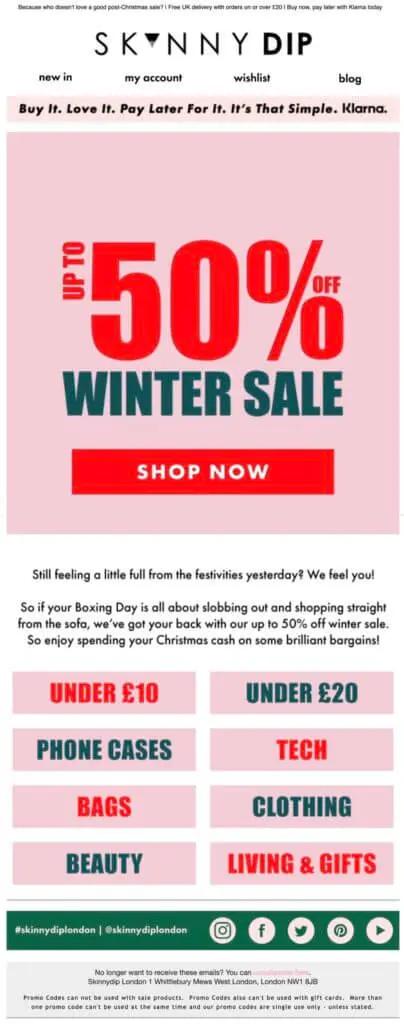
Source: Skinnydip London
3. Not into discounts? Try a different incentive
The holiday shopping season is known for steep discounts, but that doesn’t mean they’re your only option.
If discounts aren’t the right approach for your brand, consider experimenting with a different incentive to drive Boxing Day sales:
- Free gift
- Entry to a contest
- Chance to win a giveaway
- Gift card
- Free shipping
- Bundle deals
Remember, too, that people who buy from these incentives are a valuable audience. Whereas you may have an audience segment of discount shoppers, these are customer segments who don’t need a discount to buy.
Boxing Day marketing tip: When you want to get creative beyond discounts throughout the following year, pull from this Boxing Day segment and add personalised product recommendations based on past purchases.
Boxing Day marketing example: Pali Wine Co. drives up average order value
Here, see how California winery Pali Wine Co. offers a $50 gift card to customers who spend $200 during their one-day sale. It’s a smart way to not only drive up average order value, but also keep potential one-time customers coming back for more in the future.
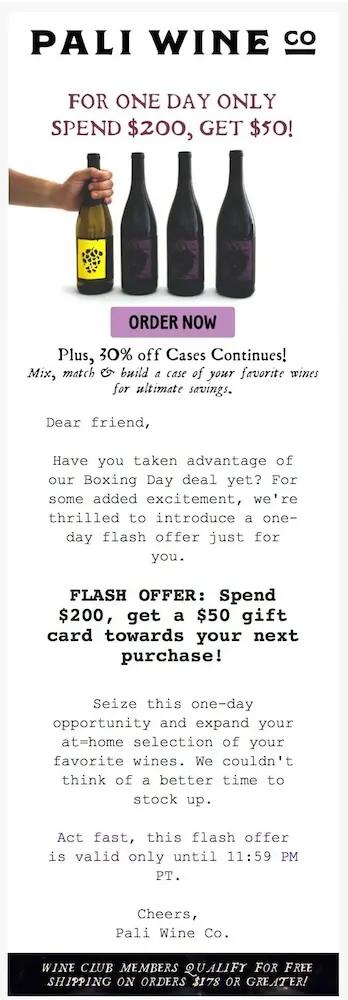
Source: Milled
4. Reduce choice overload by highlighting key products
The end of the year isn’t just expensive. It’s also overwhelming. People are visiting friends and families, cramming in holiday parties, and trying to find time to relax.
That means not everyone will be swayed by an email that advertises even the most impressive incentive. The last thing you want is to invest time and resources into crafting a gorgeous Boxing Day marketing email, only to have someone open it and bounce immediately because they’re thinking, “20% off what?”
One person’s product of interest is another’s pass. If you want to spotlight your best products for the right people, here are a few paths you can take:
- Recommend bestsellers with social proof. If you have some solid bestsellers you really need to move, highlight them with social proof such as reviews or user-generated content. Use marketing automation to automatically pull in reviews for the products you’re highlighting.
- Send personalised product recommendations. According to Klaviyo’s future of consumer marketing report, 74% of people expect personalised experiences from brands. Based on past purchasing and browsing behaviour, spotlight different items for each recipient.
- Ask people to wishlist items. Wishlisting is great for customers, and it’s great for brands. Through a self-serve customer hub on your website, encourage customers to save items for purchase later. Then, pull from that wishlist data to promote products for your Boxing Day sale.
Boxing Day marketing example: Skinfix highlights press favourites
Skincare brand Skinfix offers email subscribers a themed 20% off discount code, “BOXING20.” But then, the email goes on to highlight “press picks” of the year—and pairs each with a review that can help shoppers make a more informed decision on exactly how to use that promo code.

Source: Milled
5. Empathize with the post-holiday mindset
Deep discounts aren’t the only thing that can entice customers to spend their hard-earned dollars on Boxing Day. Remember: there’s a human being on the other side of that screen.
After the holidays, people are tired. They may even feel like they need a holiday from their holiday. While Boxing Day is about steep discounts, it’s also about self-care—especially for those who worked so hard to make the holiday memorable for their loved ones.
If it’s right for your brand, take a beat and make sure to express empathy for this audience in your messaging.
Boxing Day marketing example: Evolve Organic Beauty encourages people to treat themselves
Consider this example from skincare brand Evolve Organic Beauty. True, they’re offering an enticing 25% discount. But the real centerpiece of the email is the thoughtful note from founder Laura Rudoe, who writes about the importance of treating yourself and picking up belated gifts for friends—two things her customers might already be thinking about on Boxing Day.
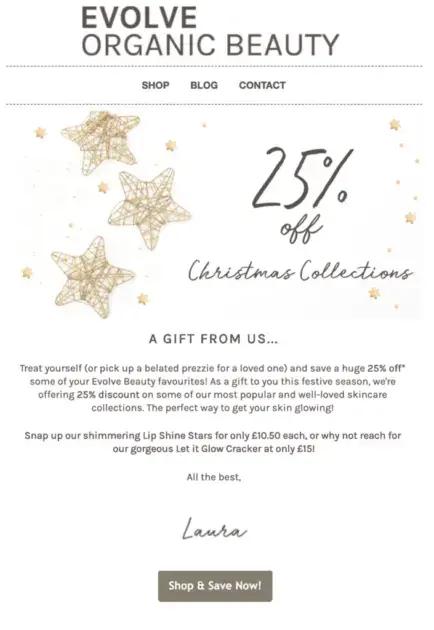
Source: Evolve Organic Beauty
6. Respect the inbox by timing your emails just right
Speaking of customer mindsets…the difference between someone opening your email and sending it straight to the trash often comes down to something infuriatingly simple: timing.
Think about your own relationship with brand emails. Receive one in the middle of dinner with your family, and you might get annoyed by the notification or miss it entirely. But receive one when you’re doom scrolling during movie night, and you might be in exactly the right mood to shop.
The thing is, everyone’s “right time” is just as different as everyone’s “right product.” Whereas marketers used to adhere to vague rules about great email timing, now they can use AI like smart send time to make sure everyone receives an email when they’re most likely to open it.
Smart send time optimises email timing by analysing past engagement patterns and sending emails to recipients at the best time within a 24-hour period. Set up your emails before Boxing Day, and make sure your sale still applies to those late-night openers.
Boxing Day marketing example: Danetti doubles their chances of an open
Contemporary furniture retailer Danetti sent two emails on Boxing Day: the first in the morning and another in the evening. This sequencing made the emails less likely to interrupt customers’ festivities with friends and family, but if a subscriber missed one, the brand still had another shot at capturing their attention.
And notice another smart timing-related move: Danetti’s evening email focused on discounted beds and mattresses—just as subscribers were thinking about turning in for the night.
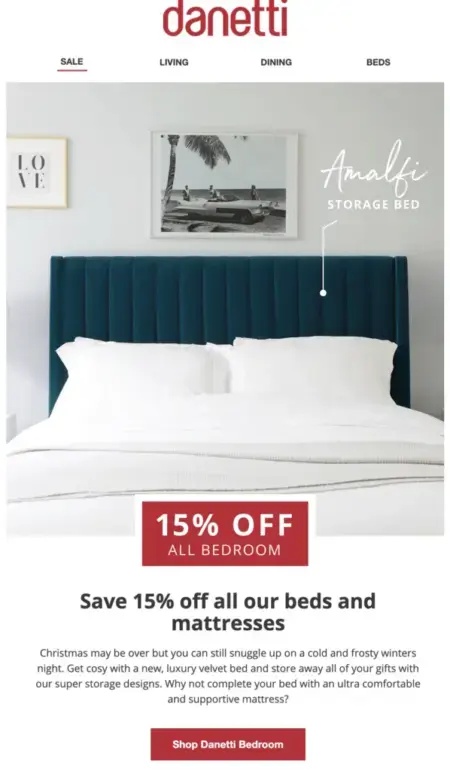
Source: Danetti
7. Tap into FOMO with a countdown timer
Depending on how you approach your email send times and sale timelines, you might be able to get your customers to take fast action during your Boxing Day sales by incorporating urgency into your messaging.
Boxing Day marketing tip: A countdown timer is a great way to spark a sense of scarcity and FOMO among your subscribers who may be in the mood to shop, but aren’t feeling quite motivated enough to simply head to your website and browse on their own.
Boxing Day marketing example: Vintage Frames Company
Here, see how eyewear brand Vintage Frames Company uses several tactics to tap into FOMO with their Boxing Day marketing email: a ticking clock, the words “deals end in,” and a flashing sign that warns, “FINAL HOURS.”
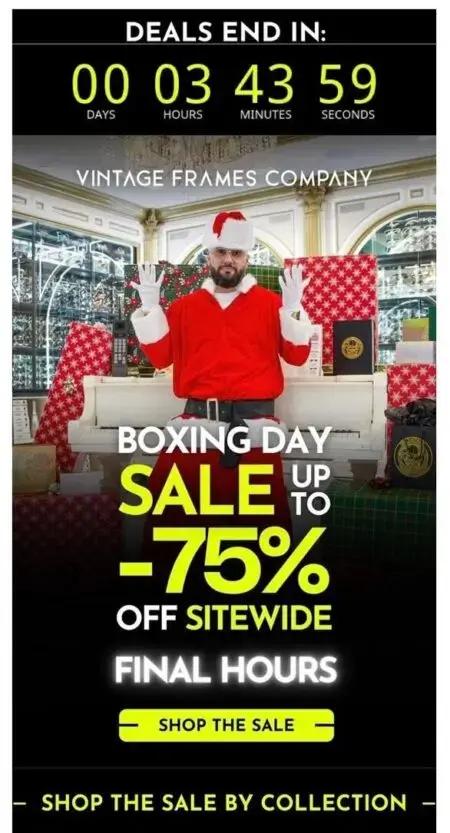
Source: Milled
8. Invite your US customers to celebrate Boxing Day, too
You’ve probably noticed that several of the examples in this article don’t actually mention “Boxing Day” at all.
Some brands choose to focus their Boxing Day email marketing copy around “winter sales,” “holiday sales,” or “after-Christmas sales” rather than “Boxing Day sales,” but still send the emails on the same day.
It’s a particularly clever tactic if you want to broaden your Boxing Day marketing to include your US customers, who may not be familiar with the holiday. Instead, appeal to something more likely to resonate, like not getting what they wished for on Christmas or needing something to buy with their holiday cash and gift cards.
Boxing Day marketing tip: If you sell products that work particularly well for winter, consider extending a winter sale after Christmas. People may spend less overall in January, but with winter beginning later in the season in some regions, your winter sale for your winterwear products may come at the right time—if it comes with an enticing incentive.
Boxing Day marketing example: Holland Cooper extends a winter sale
Here, see how luxury apparel brand Holland Cooper uses wintery imagery and product shots of cold weather clothing to advertise their “winter sale” on Boxing Day.
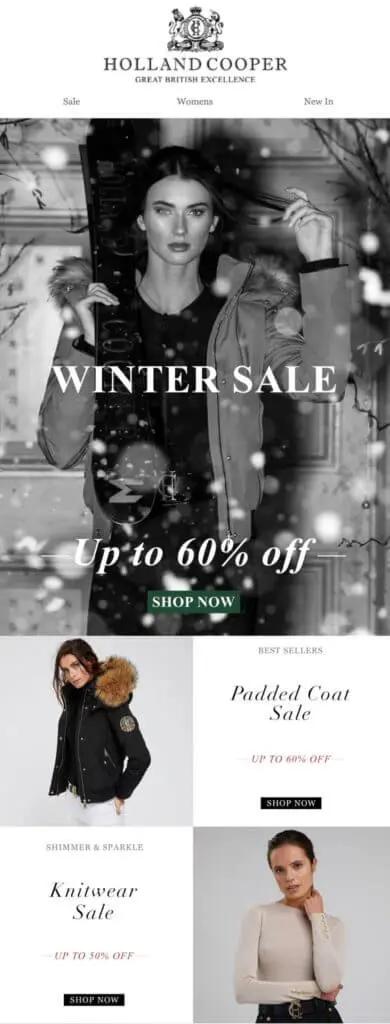
Source: Holland Cooper
9. The grand finale: help people kick start their New Year’s resolutions
Given the holiday’s proximity to the end of December, New Year’s resolutions are another option for Boxing Day marketing emails—especially for sports, fitness, nutrition, and wellness brands.
Boxing Day marketing example: Nuun offers an 8-week training program
Here, see how Nuun, a company that specializes in hydration and electrolyte products, uses Boxing Day as an opportunity to offer a free 8-week training program.
Using phrases like “start the year off strong” and “get a jumpstart on your goals,” the email not only positions Nuun as an authority on fitness, but builds trust with subscribers who are in the “fresh start” mindset—all without pushing a sale.
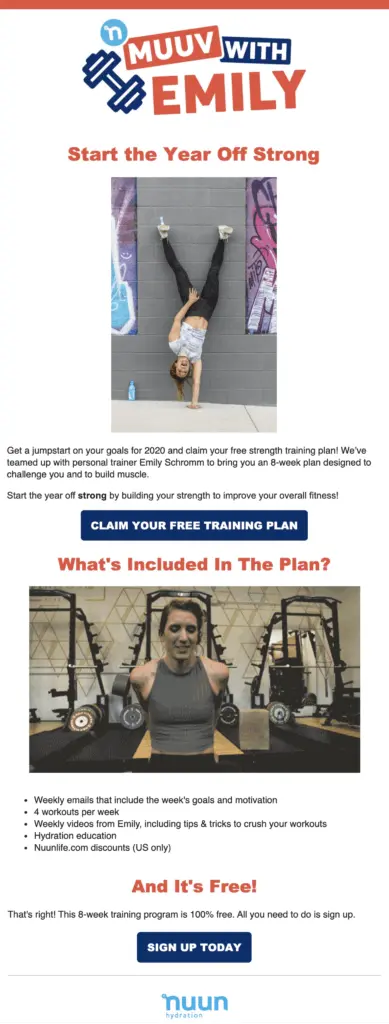
Source: Nuun
Boxing Day Sales FAQ
When is Boxing Day?
Boxing Day falls on December 26th, the day after Christmas. Historically, it was a time when servants and tradespeople received “Christmas boxes” (think gifts or bonuses) from their employers. Over time, it’s evolved into a major shopping holiday, much like Black Friday.
Which countries have Boxing Day Sales?
Boxing Day sales are big in the UK, Canada, Australia, and New Zealand—essentially, most Commonwealth countries. While the US doesn’t officially celebrate Boxing Day, many American retailers take advantage of post-Christmas shopping habits with their own December 26th sales.
What do consumers typically buy in the Boxing Day Sales?
Boxing Day shoppers love grabbing deals on items they didn’t get for Christmas. Discounted skincare, beauty, and clothing often get snapped up, but seasonal items like holiday decorations and wrapping paper are also heavily discounted, making them a big hit for bargain hunters.
Close out a great year this Boxing Day with Klaviyo B2C CRM
Boxing Day is a great way to close out the sales year, but it’s also an opportunity to collect the customer data you need to personalise your marketing efforts next year.
Klaviyo B2C CRM makes it easy for brands to collect the zero- and first-party data they need to deliver personalised experiences for their customers. As a data platform with marketing automation, customer service, and analytics under one roof, Klaviyo B2C CRM is making it possible for brands to scale personalisation for thousands or even millions of customers.
Boost sales and engagement all year long with Klaviyo.



